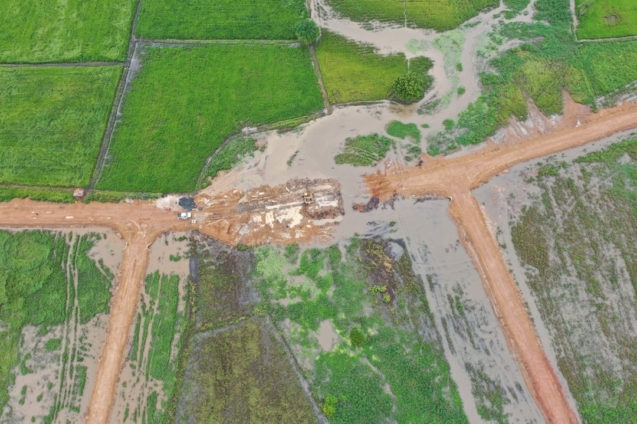Government has handed over the $3.2 million Emergency Support to Rural Livelihoods and Food Systems (ESRF) infrastructure projects to beneficiary communities across the country. The ceremony, held as Tordzinu in the Volta region, saw the handover of farm tracks, water harvesting schemes, boreholes drilled in different areas and drying platforms constructed for smallholder farmers.
Speaking at the ceremony, Minister for Food and Agriculture, Dr. Bryan Acheampong said the project aims to safeguard smallholder farmers and vulnerable communities.
“Today, we are handing over the infrastructure development intervention and Food Processing Equipment of the ESRF project. The infrastructure projects being handed over today include: 33.5 km farm tracks constructed in different regions, 200 ha water harvesting schemes constructed for smallholder farmers, 51 boreholes drilled in different regions and 47 drying platforms constructed for smallholder farmers. Additionally, ESRF supported 229 processing groups and individual smallholder farmers, particularly women and youth groups with livelihood equipment costing over $1.72 million,” he said.

Government cut sod for the commencement of the Emergency Support to Rural Livelihoods and Food Systems infrastructure projects in February 2024. The ESRF project, funded by the Government of Ghana and the International Fund for Agricultural Development (IFAD), was conceived in response to the challenges posed by the COVID-19 pandemic and climate change. Country Director of IFAD, Lakshmi Moola, expressed delight and referred to the ESRF project as a record-breaking one because it has been implemented within the stipulated time frame despite challenges.
“We’re extremely happy to be here for what is probably a record-breaking period of implementation and the handing over of key assets under the ESRF project. While it was designed under a period of emergency, COVID-19, the implementation had to adjust to a rapidly changing environment, the team was able to hasten these changes towards a very impactful delivery of investments. This is not to say there were no challenges. The challenges of this project were faced head-on, innovatively and out of the box,” she said.
Project Coordinator of the ESRF project, Dr. Hayford Baah-Adade, highlighted other aids the beneficiaries enjoyed under the project.
“Under the project, over 26,700 supply chain actors; including smallholder farmers, benefitted from personal protective equipment to prevent the spread of COVID-19. 5000 vulnerable households received a total of $1.5 million in cash transfers on their mobile phones. Over 5,500 have also been supported with processing equipment under the World Food Programme,” he detailed.
The Emergency Support to Rural Livelihoods and Food Systems (ESRF) infrastructure projects is spread across 14 regions in the country.
Latest Stories
-
Investigators scale barricades to arrest S Korea’s impeached president
15 minutes -
Reece James late free kick cancels out Semenyo stunner
32 minutes -
IPPG calls on Mahama to retain and reset the Emissions Levy
2 hours -
Resetting the Ghanaian Economy: What to focus on
2 hours -
Mahama’s visit to Bawku is critical for lasting peace – National Peace Council
3 hours -
Scores injured in Walewale as soldiers are accused of brutal assault
3 hours -
Mahama meets Mamprugu king over Bawku chieftaincy stalemate
3 hours -
Mahama calls for robust investment to uplift vulnerable populations
3 hours -
Social media hate speeches harming peace efforts in Bawku – Peace Council
4 hours -
Policy Expectations of the New Government: A robust asset and liability declaration framework
4 hours -
Engender trust to resolve Bawku crisis – Former Defence Minister Dominic Nitiwul advises
5 hours -
Guardiola divorces wife of 30 years
5 hours -
Up to 4 in 10 people could develop dementia after 55. What you can do to lower your risk
5 hours -
Mohbad’s widow, father face-off over DNA test
5 hours -
US to remove Cuba from state sponsors of terror list
5 hours

